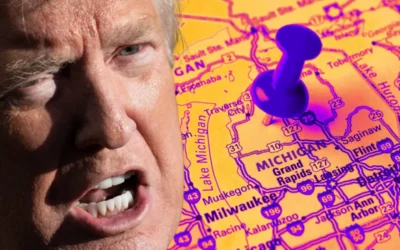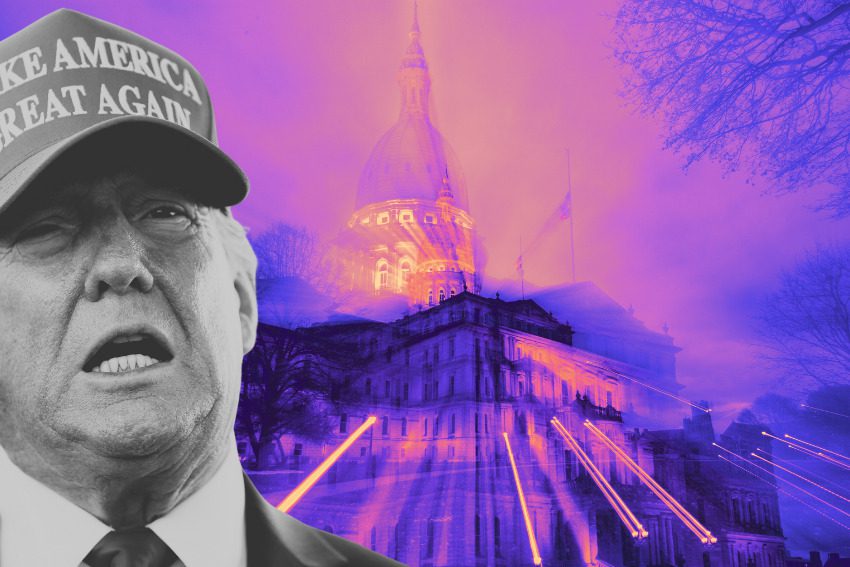
(Photo Illustration/Michael M. Santiago/Getty Images)
Newly unsealed federal court filings revealed a detailed narrative of how ex-President Donald Trump and his campaign staffers tried to push conspiracy theories and violence to overturn the 2020 election.
MICHIGAN—Ex-President Donald Trump’s plan to cling to power after losing the 2020 election is coming into sharper focus after newly unsealed court filings revealed explosive new details about how Trump’s team plotted to disrupt the democratic process—especially in Michigan.
New filings unsealed this week from special counsel Jack Smith provide new evidence showing that Trump and his campaign operatives didn’t just refuse to accept defeat in the 2020 presidential election, but actively laid the groundwork to try to overturn the election before he even lost.
That includes several newly revealed text messages between Trump campaign operatives which show they had discussed inciting a “riot” outside of an absentee ballot counting center in Detroit, as well as evidence that Trump had pressured top Michigan Republicans to peddle lies about malfunctioning voter machines in an effort to sow confusion and distrust among voters.
In all, the documents offer the most comprehensive view to date of what federal prosecutors intend to prove if the case charging Trump with conspiring to overturn the election reaches trial.
They also feature several previously unknown accounts offered by Trump’s closest aides to paint a portrait of an “increasingly desperate” president who, while losing his grip on the White House, “used deceit to target every stage of the electoral process”—including in Michigan.
Here’s the deal:
Although a months-long congressional investigation and the indictment itself have chronicled in stark detail Trump’s efforts to undo the 2020 presidential election results, the new filing offered even more new evidence from the landmark criminal case against the former president.
The brief—which was made public over the Trump legal team’s objections—was submitted, initially under seal, following a Supreme Court opinion that conferred broad immunity on former presidents for official acts they take in office, a decision that narrowed the scope of the prosecution and eliminated the possibility of a trial before next month’s election.
The ultimate purpose of the brief is to persuade US District Judge Tanya Chutkan that the offenses charged in the indictment were undertaken in Trump’s private, rather than presidential, capacity and can therefore remain part of the case as it moves forward. Chutkan permitted a redacted version to be made public, even though Trump’s lawyers argued that it was unfair.
Though the prospects of a trial are uncertain, particularly if Trump wins the presidency and a new, Trump-appointed attorney general seeks the dismissal of the case, the brief nonetheless functions as a roadmap for the testimony and evidence prosecutors would elicit before a jury.
It’s now up to Chutkan to decide which of Trump’s acts are official conduct for which he is immune from prosecution and which are “private crimes” on which the case can proceed.
Where does Michigan come into play?
The filing alleges that Trump “laid the groundwork” for rejecting the election results before the contest was over, telling advisers that in the event he held an early lead he would “declare victory before the ballots were counted and any winner was projected.” Immediately after the election, prosecutors say, his advisers sought to sow chaos in the counting of votes.
In one instance, a campaign employee described as a Trump co-conspirator, was told that results favoring Biden at a Michigan polling center appeared accurate. The person is then alleged to have replied: “find a reason it isn’t” and “give me options to file litigation.”
When the colleague suggested that there was about to be unrest reminiscent of the Brooks Brothers Riot, a violent (and successful) effort to stop a recount in Florida after the 2000 presidential election, the campaign staffer responded: “Make them riot” and “Do it!!!,” the filing states.

The new filings also detail an interaction between Trump and then-Republican National Committee Chair Ronna McDaniel, where the former president reportedly asked for McDaniel to share a widely debunked report about malfunctioning voting machines in Antrim County.
McDaniel called the report inaccurate. And after discussing it with then-state House Speaker Lee Chatfield, she reportedly told Trump the report was “fucking nuts,” according to the filing.

Additionally, prosecutors also allege that Trump advanced claims of fraud despite knowing they were false, citing how he repeatedly lied about ballots being cast by dead people in Michigan.
All told, the state of Michigan and Detroit are mentioned at least 60 times in the new 165-page document, according to reports from Bridge Michigan. That also includes a chronicle of how Trump and his attorney Rudy Giliani pushed election conspiracies to several state lawmakers.
What else is in the new filings?
Prosecutors also alleged that Trump personally advanced claims of fraud despite knowing they were false, recounting how he conceded to others that allegations of election irregularities made by attorney Sidney Powell were “crazy” and referenced the science fiction series “Star Trek.”
Even so, days later, he promoted on Twitter a lawsuit she was about to file.
In demonstrating Trump’s indifference to the accuracy of the election fraud claims, prosecutors also cited an account of a White House staffer who, after the election, overheard Trump telling his family: “It doesn’t matter if you won or lost the election. You still have to fight like hell.”
The filing also includes details of conversations between Trump and former Vice President Mike Pence, including a lunch in 2020, in which Pence “reiterated a face-saving option” for Trump, telling him, “Don’t concede but recognize the process is over.” In another lunch, Pence also urged Trump to accept the election results and run again in 2024: “I don’t know, 2024 is so far off,” Trump told him, the filing states.
Prosecutors also argue Trump used his Twitter account to spread false claims of election fraud, attacking “those speaking the truth” about his loss and exhorting his supporters to travel to Washington for the Jan. 6, 2021, certification. They intend to use “forensic evidence” from Trump’s iPhone to provide further insight into Trump’s actions after the Capitol attack.
Of the more than 1,200 tweets Trump sent during the weeks detailed in the indictment, the vast majority were reportedly about the 2020 election—including those falsely claiming Pence could reject electors even though the vice president told Trump that he had no such power.
That “steady stream of disinformation” culminated in Trump’s speech at the Ellipse, just south of the White House, on the morning of Jan. 6, 2021, where Trump “used these lies to inflame and motivate the large and angry crowd of his supporters to march to the Capitol and disrupt the certification,” prosecutors wrote.
Trump’s “personal desperation was at its zenith,” however, earlier that morning when he was “only hours from the certification proceeding that spelled the end,” prosecutors wrote.
For the Record:
There is no evidence of widespread voter fraud in the 2020 presidential election. A coalition of federal and state election and cybersecurity officials called the 2020 presidential election “the most secure in American history.” Trump’s own attorney general, along with a growing list of his former staffers, have also said there was no fraud or wrongdoing in the 2020 election.
READ MORE: 13 Times Michigan was mentioned in Trump’s 2023 indictment
For the latest Michigan news, follow The ‘Gander on Twitter.
Follow Political Correspondent Kyle Kaminski here.
Support Our Cause
Thank you for taking the time to read our work. Before you go, we hope you'll consider supporting our values-driven journalism, which has always strived to make clear what's really at stake for Michiganders and our future.
Since day one, our goal here at The 'Gander has always been to empower people across the state with fact-based news and information. We believe that when people are armed with knowledge about what's happening in their local, state, and federal governments—including who is working on their behalf and who is actively trying to block efforts aimed at improving the daily lives of Michigan families—they will be inspired to become civically engaged.

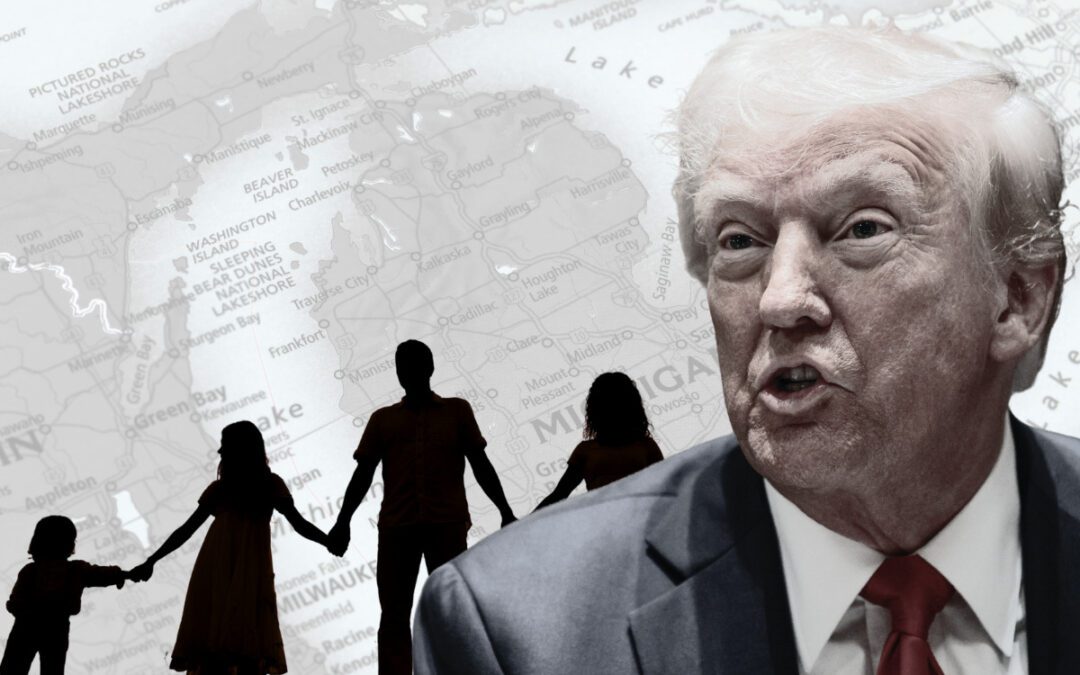
Opinion: The America my parents believed in is disappearing
Michigan State Rep. Mai Xiong reflects on the fear Trump's immigration policies are causing for Michigan families. Last November, I wrote in the...
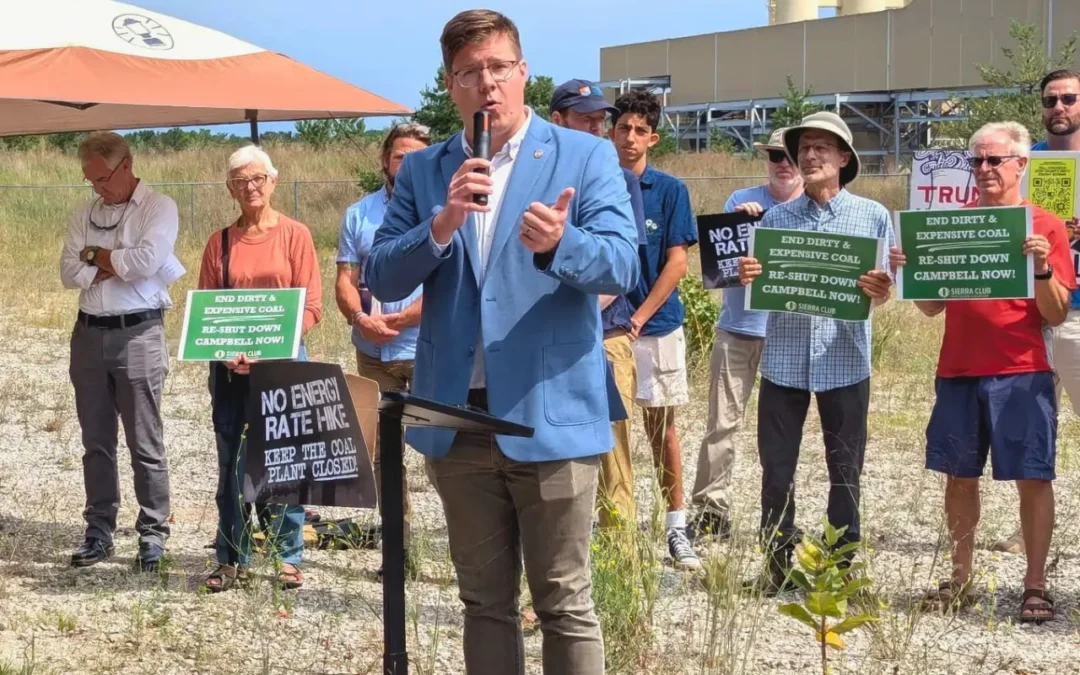
Activists, officials call for closure of Ottawa County coal plant as utility looks to recover costs
BY SARAH LEACH, MICHIGAN ADVANCE OTTAWA COUNTY—“We are standing here today to stand up to the Trump Administration to tell them, ‘Get this coal...
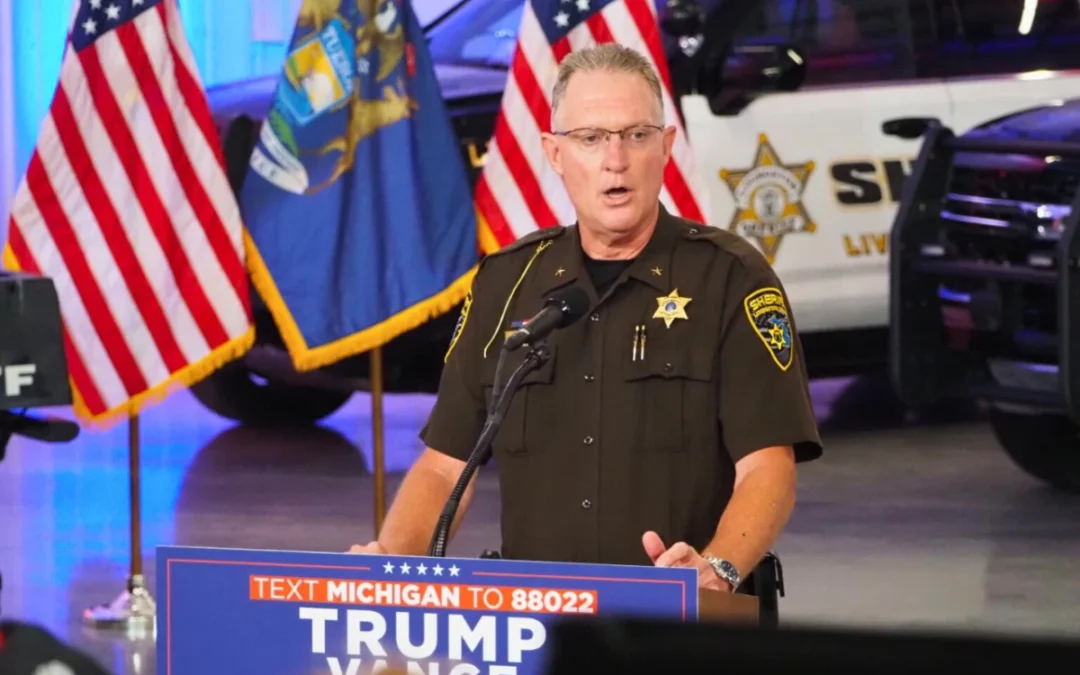
MAGA Michigan sheriff faces new criticism for politicking with official resources
BY BEN SOLIS, MICHIGAN ADVANCE MICHIGAN—Livingston County Sheriff Mike Murphy, who’s also running for the Michigan Senate, held a political...

Michigan disability advocates slam cuts to SNAP and Medicaid as attacks on autonomy
BY KYLE DAVIDSON, MICHIGAN ADVANCE LANSING—Standing before the Michigan State Capitol on Tuesday, a group of disability self-advocates took Congress...

7 Michigan Republicans vote to help Trump gut health care for 200,000 Michiganders
Michiganders are bracing for consequences after President Donald Trump signed Republican-led legislation to cut federal funding for Medicaid. ...



